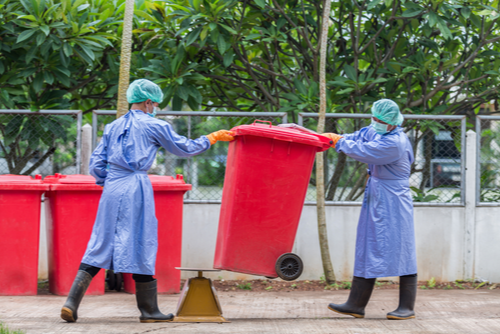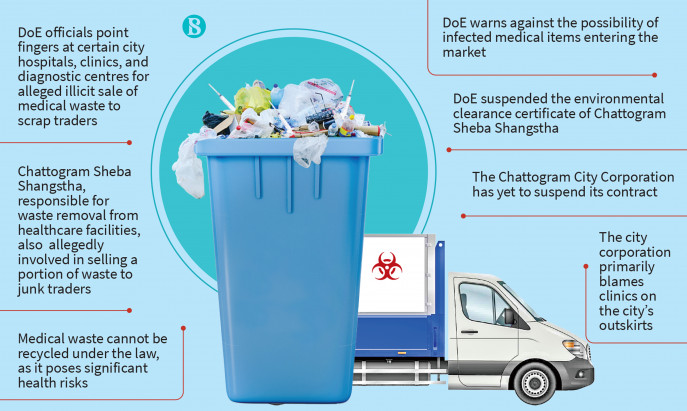Area Care: Smooth and Reliable Medical Waste Removal Near Me
Area Care: Smooth and Reliable Medical Waste Removal Near Me
Blog Article
Stay Ahead of Rules: Specialist Recommendations on Medical Waste Disposal
In a globe where the healthcare market is frequently developing, it is crucial for medical facilities to remain ahead of regulations when it comes to the proper disposal of medical waste. From comprehending the various groups of clinical waste to applying the appropriate collection and partition methods, this discussion will provide important insights and workable pointers to help facilities stay ahead of guidelines in the ever-changing landscape of medical waste disposal.
Understanding Clinical Waste Categories
Comprehending clinical waste groups is essential for proper disposal and management in health care facilities. Clinical waste refers to any kind of waste generated by healthcare activities that may present a risk to public health or the atmosphere. It is crucial to classify clinical waste properly to guarantee its secure handling, disposal, treatment, and transportation.
There are several classifications of clinical waste that medical care centers need to be accustomed to. One of the most usual categories consist of transmittable waste, pathological waste, sharps waste, pharmaceutical waste, and chemical waste. Each group has specific standards and guidelines for its appropriate management and disposal.
Contagious waste consists of materials polluted with blood or other bodily liquids, such as handwear covers, gowns, and research laboratory cultures. Pathological waste describes human tissues, body organs, or body parts that need special delivery and disposal. Sharps waste consists of used needles, syringes, and various other sharp items that can cause injury and transfer infections. Drug waste comprises ended, unused, or polluted medicines that require careful handling and disposal. Chemical waste includes solvents, disinfectants, and other chemical compounds utilized in medical care centers.
Remaining Up-To-Date With Regulatory Changes
Remaining present with governing adjustments is important for medical care centers to make sure conformity and appropriate monitoring of clinical garbage disposal. medical waste removal. With laws continuously advancing, it is necessary for medical care centers to remain updated to prevent penalties, fines, and possible injury to the setting and public wellness
To remain in advance of regulative changes, medical care centers should establish a system for tracking and monitoring updates. This can be done by subscribing to governing e-newsletters, attending workshops and seminars, and actively participating in industry organizations. Furthermore, facilities must mark an employee or group accountable for remaining educated and disseminating details to pertinent stakeholders.
Normal communication with regulatory firms is also essential. Medical care centers must establish partnerships with neighborhood, state, and federal companies to guarantee they are conscious of any adjustments in guidelines that may influence their waste management methods. This can be done through normal meetings, participation in public remark durations, and positive engagement with governing companies.
Additionally, medical care centers must think about partnering with waste monitoring firms that concentrate on clinical garbage disposal (medical waste disposal services with WasteX). These companies are often fluent in the current laws and can give guidance and support to ensure compliance
Applying Appropriate Collection and Segregation Approaches
To successfully take care of medical garbage disposal, medical care centers must develop proper collection and segregation methods in conformity with regulatory guidelines. Implementing these techniques makes sure the safe handling and disposal of potentially harmful products, safeguards the environment, and decreases the threat of injuries and infections to healthcare employees and the public.
Appropriate collection and segregation approaches involve making use of marked containers and identifying systems. Medical care centers ought to offer plainly classified containers for various kinds of clinical waste, such as sharps, infectious waste, pharmaceutical waste, and non-hazardous waste. These containers should be color-coded and plainly significant to avoid complication and advertise simple identification.
Furthermore, medical care centers should educate their personnel on the right procedures for collecting and setting apart medical waste. This medical waste disposal services with WasteX consists of enlightening them on the various types of waste, the appropriate containers to use, and the significance of following policies and standards. Normal training sessions and correspondence course ought to be carried out to guarantee that personnel members stay up-to-date on ideal methods.
Furthermore, medical care facilities should establish a system for normal collection and disposal of medical waste. This might entail partnering with accredited waste management companies that focus on clinical garbage disposal. These firms will ensure that the accumulated waste is transported and taken care of in compliance with regulatory needs.
Choosing the Right Disposal Methods

Incineration is just one of one of the most effective and usual methods for throwing away certain kinds of medical waste, such as pathological waste and sharps. It entails the controlled burning of waste at heats, reducing it to ash. Nonetheless, incineration can launch hazardous contaminants right into the air and contribute to air contamination.

Other disposal methods include chemical treatment, microwave treatment, and landfilling. Chemical treatment includes making use of chemicals to counteract the waste and sanitize. Microwave treatment utilizes microwave energy to warmth and sanitize the waste. Landfilling entails hiding the waste in a designated garbage dump area (medical waste disposal services with WasteX). Landfilling ought to be the last resort due to the possible threat of contamination to dirt and groundwater.
Guaranteeing Conformity Through Documentation and Training
After very navigate to this site carefully taking into consideration the appropriate disposal methods for clinical waste, healthcare centers should ensure conformity with policies and decrease ecological influence by applying efficient paperwork and training procedures. This action is crucial in maintaining a safe and sustainable environment for both health care workers and the public.

Training is similarly important in making sure compliance with regulations. Health care employees that handle clinical waste ought to obtain appropriate training on waste segregation, handling, and disposal treatments. This training ought to cover topics such as the correct use individual safety equipment, identification of different kinds of waste, and the correct disposal techniques for every waste group. By offering thorough training, healthcare centers can empower their team to make informed decisions and lessen the danger of improper garbage disposal.
Final Thought
In final thought, medical waste disposal services with WasteX remaining in advance of regulations in clinical waste disposal is crucial for health care centers. medical waste removal service. Recognizing the various classifications of medical waste, remaining updated with governing adjustments, applying proper collection and partition techniques, selecting the ideal disposal methods, and making certain conformity with documentation and training are all necessary actions. By complying with these standards, health care organizations can efficiently dispose and take care of of medical waste in a risk-free and liable manner
From understanding the different categories of clinical waste to executing the appropriate collection and segregation approaches, this conversation will supply important understandings and workable suggestions to help centers remain ahead of policies in the ever-changing landscape of clinical waste disposal. - medical waste disposal services with WasteX
The most typical categories consist of contagious waste, pathological waste, sharps waste, pharmaceutical waste, and chemical waste. Healthcare facilities should supply clearly labeled containers for various kinds of medical waste, such as sharps, contagious waste, pharmaceutical waste, and non-hazardous waste. Health care centers should develop a comprehensive system to videotape and track all elements of clinical waste disposal, including kinds of waste produced, quantities, and disposal approaches used. Medical care employees that take care of clinical waste ought to receive ideal training on waste partition, managing, and disposal treatments.
Report this page